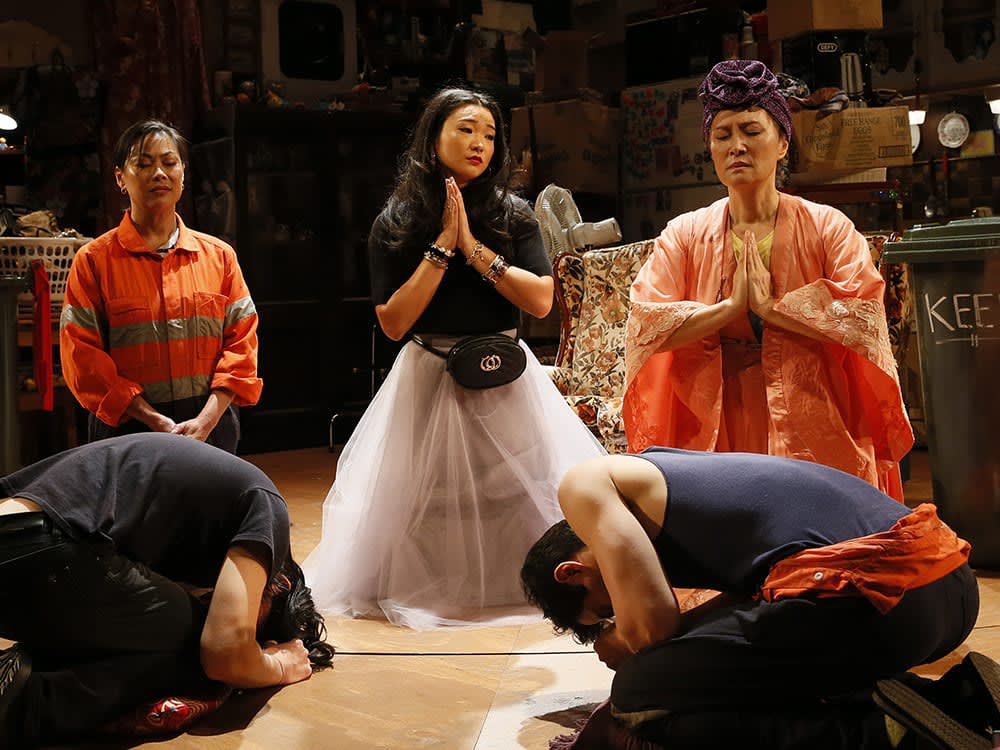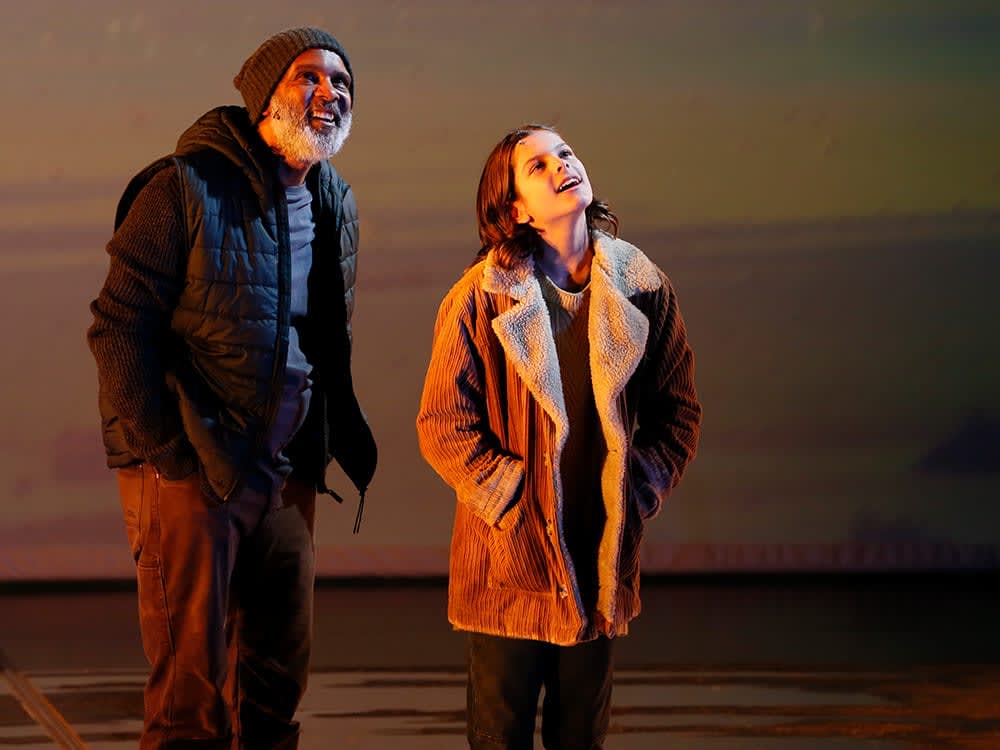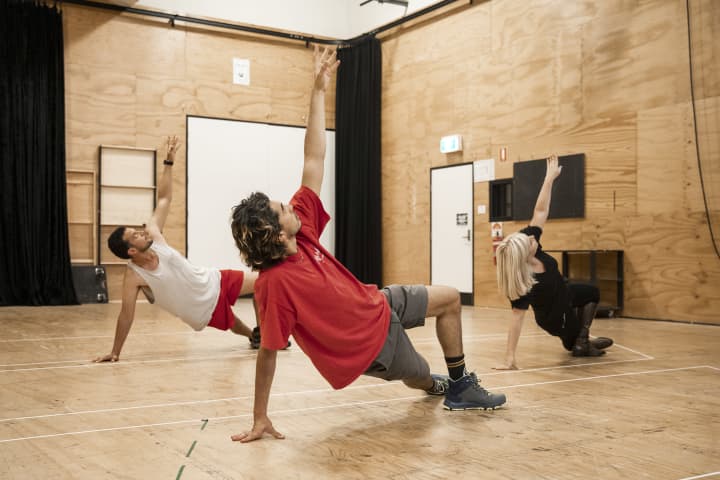The full question submitted by an anonymous asker is: Do any of your actors have certain theatrical superstitions? Has anyone ever seen a theatre ghost?!
Great question! To answer it, we approached a few actors who’ve performed in MTC theatres over the years, and it’s clear from their answers that the stage is indeed a significant site of superstitious behaviour and spooky sightings.
The theatre is, in fact, the second most superstitious institution, only pipped at the post by horse racing. This was the conclusion of Robert Wilson Lynd, who in 1921 wrote a New Statesman article, ‘A Defence of Superstition’, that contained the world’s first-known printed mention of the phrase break a leg. It was in reference to racing but the reasoning behind it is familiar to actors everywhere: wishing someone good luck might tempt fate and produce bad luck; substituting something insulting or unpleasant like break a leg is safer.
The exact origins of this kind of superstitious reverse psychology are debated, but whether it’s saying chookas before a show – a uniquely Australian take on break a leg – or a more personal ritual, there is scientific evidence that such magical thinking does, in fact, serve a psychologically beneficial place in our lives. There’s a reason it’s universal, after all.

Miriam Margolyes (with Pamela Rabe, left) in Blithe Spirit. Photo: Jeff Busby
Superstitions and rituals
Miriam Margolyes (last seen on the MTC stage in The Lady in the Van) doesn’t believe in ghosts – ‘We have enough real horrors to deal with’ – but she does have a superstition: ‘I never allow sewing to be done on me unless I have a piece of the same cotton in my mouth,’ she says. ‘Drives wardrobe departments mad!’
Storm Boy’s Tony Briggs also has a personal ritual. ‘I have a type of prayer that I do and have done since the beginning of my career,’ he says. ‘It’s actually a poem that was penned by a family member. I do it from time to time during the course of a production to keep me focused, or to re-focus me if need be. I can’t function if I don’t read it through at least once before going on stage.’

Diana Lin (top right) with Torch the Place cast Fiona Choi, Michelle Lim Davison, Max Brown and Charles Wu. Photo Jeff Busby
Though she doesn’t identify as a religious person, Diana Lin prays before every show, and she convinced her Torch the Place cast mates to join her. Lin began this ritual when she was studying at Shanghai Theatre Company, where a friend and fellow student told her about all the gods, or bodhisattva, in the theatre world. ‘So before you come to the theatre, you have to let them know that you appreciate them, and offer them thanks and prayers to look after you, and that your play is going to be successful and safe. And you pray for everyone on the stage to be safe, and to have great shows. And I believe in that too.’
Home, I’m Darling’s Susie Youssef denies that it’s a superstition, but she sings. ‘For some reason, and I don’t know why, I always sing Put a Penny in the Slot by Fionn Regan before every theatre performance. And I’ve always done that.’

Susie Youssef (with Perter Paltos) in Home, I'm Darling. Photo: Jeff Busby
Ghosts and unexplained phenomena
Unlike Margolyes, Briggs has seen ghosts in most theatres around the country, ‘especially the theatres that don’t bother with smoking ceremonies.’ He clarifies that what he’s seen would probably be described as more of an entity than a ghost, but adds that it’s ‘too scary to talk about.’

Tony Briggs (with Conor Lowe) in Storm Boy. Photo: Jeff Busby
Melita Jurisic has ‘too many stories to tell’ about theatrical superstitions, ghosts and unexplained phenomena. ‘Needless to say, I believe when the great man said: There are more things in heaven and earth, than are dreamt of in your philosophy.’
She shared with us the following anecdote:
‘One of my most vivid childhood memories is of sitting with my parents on a beautiful, balmy evening watching a performance in a Croatian amphitheatre – although they insist no such thing happened. Often I would mention it as being one of the happiest memories I had shared with them. Yet still they would tell me that we were nowhere near such a place when I was growing up and that they never took me to any kind of theatre, let alone an amphitheatre. I put it down to probably being a blissful dream that had made a deep impression on me and that I could not forget.
‘Years later, once we’d migrated to Australia, I began describing the performance in more detail to my mother and one day she realised, with amazement, that she had indeed been present with my father at just such a performance... but I was not born yet. She was, however, already pregnant with me!’

Melita Jurisic in Arbus & West. Photo: Jeff Busby
In the category of unexplained phenomena, Jurisic also include miracles. ‘They say miracles happen all the time... we just don’t see them.’ By way of example, she tells us about an occurrence at the very beginning of her career:
‘My professional debut was in a play called Lovers, by Irish playwright Brian Friel, at a little theatre in Melbourne. I was a teenager still living with my parents and trying to distract myself from the inevitably terrifying emotions of the day of the premiere. The television was on as my mother had tuned in to watch reruns of Ben Casey, an American medical drama series. It was not really holding my attention as my mind was full of anxiety for my looming and dreaded rising to the occasion of the Opening Night. I was staring, as I often did, at the photos of the original production of the play that were displayed on my play book’s front and back covers and particularly at the captivating images of Fionnula Flanagan, who was the original actress to play the role I was playing. As I distractedly looked up to gaze at the television I saw a face I knew well enough by now. There, on an American TV series, was the Irish actress Fionnula Flanagan in that episode’s guest role. I’d never seen her performing previously in anything. It was so surprising that I took it as a sign I was where I should be and that there was no point in being crippled by nerves if you have found your true vocation. They say miracles happen all the time... we just don’t see them.
Have something to ask MTC? You can submit your question and in the coming weeks it might be yours that we answer.
Published on 25 November 2020





